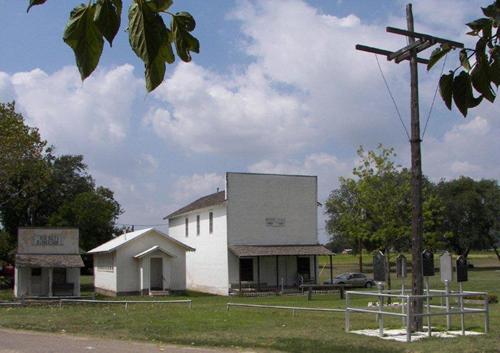|
|
One
of the first thing Anglo settlers did when they got to the
Panhandle was create a town in the northeast Panhandle
near Sweetwater Creek. They called it Hidetown.
No, wait. That's not exactly right. The people who set up the town
weren't what we call settlers - they were buffalo hunters, down
from Kansas, where the buffalo and, by extension, buffalo hunters
were already a thing of the past. They were there for the buffalo,
not the settling.
And it wasn't really a town, either. It was a hunter's camp with
affordable housing - buffalo hide shelters. Hidetown. A year later
the U.S. Army established Fort
Elliott a few miles from away, which offered some protection
for the town and, along with the Texas Rangers, a measured dose
of law and order.
By then, the good people of Hidetown sought a more dignified name.
They took to calling it Sweetwater, in honor of the creek that provided
precious water in that arid land, but the U.S. Post Office already
had a town
by that name.
George Montgomery, the town's first postmaster, decided to solve
the dilemma by sending to Fort
Elliott for an Indian scout to come to town and offer a tribal
name. Or so the story goes. Two Indians showed up along with famous
buffalo hunter Billy Dixon, who served as an interpreter.
Mobeetie, they said, is the Indian word for Sweetwater. The townspeople
were delighted. Mobeetie
it was.
Later, the
townspeople learned that the Indians duped them. Mobeetie, according
to the story, actually translates from English to "buffalo dung"
in Cheyenne.
Interesting,
if true, as columnist L.M. Boyd liked to say.
Maybe
the Indians were psychic, because Mobeetie was as rank a place as
any fancier of rankness could ever want. Gamblers, prostitutes and
gunfighters turned Mobeetie
from Hidetown into a frontier Sodom and Gomorra. Pioneer Panhandle
cattleman Charles
Goodnight described the town as "patronized by outlaws, thieves,
cut-throats and buffalo hunters, with a large percentage of prostitutes."
Temple Lea Houston, Sam
Houston's youngest son, wrote his wife that Mobeetie
was "a baldheaded whiskey town with few virtuous women."
|
 |
|
Businesses
of the day included such entrepreneurial shenanigans as the Pink
Pussycat Paradise, the Buffalo Chip Mint and the Ringtown Saloon,
a whorehouse that catered to black men - mostly the Buffalo
Soldiers from Fort
Elliott. Tourists and celebrities who visited the town included
Billy the Kid, Wyatt
Earp and Pat Garrett. Happy-go-lucky
murderer Clay Allison lived just outside of town for a while, and
even got married in Mobeetie.
Bat
Masterson, soon to be a Western legend his ownself, showed up with
the buffalo hunters in Mobeetie (called Sweetwater at the time)
in 1876. Dapper as any buffalo hunter could be, Bat frequented the
Lady Gay Saloon and was reportedly sweet on a pretty dance hall
girl named Mollie Brennan, but an ex-cavalry sergeant named Melvin
King had his eye on Mollie, too.
One night when the poker didn't turn out the way King had hoped,
he found Bat and Mollie at the Lady Gay, being sweet to one another.
King pulled his pistol and fired two shots. The first bullet from
King's gun hit Bat in the hip, and caused him to walk with a limp
for the rest of his life. The second one killed Mollie. Bat raised
himself from the floor and fired one fatal shot at King.
That's one version of the story, of which there are three. Robert
K. DeArment, Bat Masterson's most reliable biographer, wrote of
the incident, "We have only Bat's story, as retold by three other
men, the details differing in each instance."
At any rate, Bat took his broken heart and wounded hip to Dodge
City and fame as a lawman, gunfighter and gambler. They buried Mollie
in a cemetery outside of town.
Mobeetie continued
to rock along until around 1890, when Fort
Elliott closed up shop. The saloons closed after a well-received
revival meeting in 1893 resulted in some 300 conversions. A tornado
destroyed most of the town and killed seven people in 1898. A controversial
election in 1907 moved the county seat of Wheeler
County from Mobeetie to the town of Wheeler.
When the Santa Fe Railroad line from Pampa
to Oklahoma missed Mobeetie
by a couple of miles in 1929, the town packed up and moved the two
miles north to New Mobeetie and stayed there, another once-thriving
town with a great future behind it.
© Clay Coppedge
"Letters from Central Texas"
January 3, 2017 column
|
|
|
